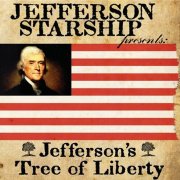 With the temperature dropping, it's time to find someone to keep you warm. Find your hookups with our online dating guide!
With the temperature dropping, it's time to find someone to keep you warm. Find your hookups with our online dating guide!
Jefferson’s Tree of Liberty
- Folk
- 2008
- Buy the CD
Reviewed by Lee Zimmerman
Its apt play on the Jeffersonian theme aside, Jefferson’s Tree of Liberty ought to provide comfort and consolation for anyone who resigned themselves to the sad prospect that Jefferson Starship would be forever content to rehash the hits that brought the Airplane and the early Starship to the masses. Indeed, after a disruptive lawsuit over who could claim rights to the band’s branding, a series of repetitive live albums and relegation to the oldies circuit, who could have guessed that this band were capable of such a rousing return?
But come back they have, with an album that’s as stirring as Volunteers in all its rousing revelry. While these songs may be borne from a generation or more past, the Airplane/Starship formula remains intact – in the anthemic melodies, the vibrant vocal interplay and the call to arms that billows from every one of these riveting refrains. It’s no accident, either; the instrumental introductions to “Wasn’t That a Time” (now more a rallying cry than the reflective clarion call of the Weavers’ original) and “In a Crisis” (sung by Darby Gould with a swagger and roar that recalls Grace Slick in full fury) borrow the decisive guitar riff that drove “Volunteers.” So too, the album’s sole original, Kantner’s “On the Threshold of Fire,” echoes the tribal confluence of Blows Against the Empire, the very first album issued under the Starship banner. To reinforce those ties even further, there’s a surprise cameo appearance by the long-retired Slick herself, on the untitled bonus track at the end of the set.
Still, despite the fact that Jefferson’s Tree of Liberty is clearly a fond look backwards, it’s also a strong affirmation by a band still daring to make a righteous wail in today’s troubled times. So while many of these songs have been replayed countless times over the ages, these renderings are as evocative and heartfelt as they were in their original incarnations. It’s a feat of no small accomplishment; even songs as familiar as Fairport Convention’s “Genesis Hall,” Phil Och’s “I Ain’t Marching Anymore,” and the Byrds’ “Chimes of Freedom” are reinvigorated and redefined. There’s no better example of their interpretive genius than the interspersing of John Lennon’s “Imagine” with Bob Marley’s Redemption,” especially when it comes to sourcing sheer inspiration.
That said, there is a minor complaint. The searing vocals from Marty Balin on “Maybe for You” and David Freiberg on “Cowboy on the Run” both beg the question of why these men weren’t given more than a cursory appearance. Regardless, for the sum total of its achievements, Jefferson’s Tree of Liberty offers clear evidence that Jefferson Starship is refueled and still soaring.
You can follow us on Twitter and Facebook for content updates. Also, sign up for our email list for weekly updates and check us out on Google+ as well.











